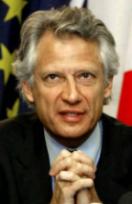French PM calls for ‘shuttle diplomacy’ to resolve Darfur crisis
March 15, 2007 (UNITED NATIONS) — The French prime minister said Thursday the humanitarian crisis in conflict-wracked Darfur should be at the top of the U.N. agenda and called for shuttle diplomacy to try to reach a political solution.

Villepin spoke to reporters after a meeting with Secretary-General Ban Ki-moon on a range of issues from French peacekeeping troops deployed in Lebanon to the Iranian nuclear standoff and support for the Israeli-Palestinian peace process.
Villepin said the humanitarian crisis in Darfur was one of the issues that should “be at the top of the United Nations’ agenda.”
He backed a proposed new Security Council resolution increasing sanctions against Iran, which was being introduced in the council as he spoke, saying it created “the basis for a solution.”
The draft resolution calls for new sanctions to pressure Iran to suspend uranium enrichment. In December, the Security Council unanimously approved limited sanctions that targeted Iran’s nuclear and missile programs because it refused to freeze enrichment. Since then, Tehran has stepped up its enrichment program.
“It’s a progressive, reversible process,” Villepin said of the new draft resolution. “We gave the choice to the Iranians.”
Villepin pointed to the process of gradually stepping up sanctions that has shaped the Security Council’s negotiations with Iran as a model for addressing all crises, which the council did not do before the current war in Iraq.
“I hope that we might also take from this experience, on another crisis, to understand that there is no solution for any crisis without collective will, support from the international community and the United Nations, and a very strict timetable,” he said.
France led opposition to U.S. and British efforts to get Security Council authorization for the Iraq war that toppled Saddam Hussein’s government in 2003.
Alluding to the current debate in the U.S. Congress on the length of the American deployment in Iraq, Villepin said, “It’s always better to prepare the withdrawal of troops throughout a full year than to decide in a couple of minutes that it’s time to go.”
On other issues, Villepin lauded a peace accord between the government and rebels in Ivory Coast signed earlier this month, and said it could pave the way for the withdrawal of French troops deployed in the West African nation.
“We think the progress toward a political solution … could open the path for a withdrawal,” he said.
Some 4,000 French troops currently patrol a buffer zone between the two warring sides. The accord calls for the dismantling of the zone to allow freedom of movement across it.
The prime minister also spoke with the secretary-general about the creation of a Palestinian unity government, the status of Kosovo and the question of Western Sahara.
A unity government among the Palestinians, formed Thursday after months of contentious negotiations, “opens the path to new perspectives,” he said.
“We hope this opportunity can be seized,” he added, noting that any government must abide by three internationally recognized principles — renunciation of violence, recognition of Israel and acceptance of previous international agreements.
Israel has already rejected the new government because its platform does not explicitly recognize the Jewish state. Israel has called on Western governments to maintain their aid embargo, initiated a year ago when Hamas came to power.
(AP)
